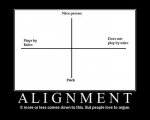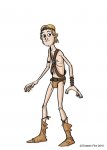h/t [MENTION=6906155]Paul Farquhar[/MENTION]
So a recent comment in a different thread started my thought process, and here it is-
"
Racial stat boosts are one of the things that makes D&D D&D and not some generic fantasy roleplaying game."
So, what does make D&D, D&D? I mean, really?
I was thinking in terms of 5e (which is why it is posted here), and how one of the reasons 5e is supposedly appealing is that it manages to rope in some of the nostalgia/OSR/1e crowd (who, hopefully in turn, is teaching it to the young 'uns). This makes 5e very, um, D&D? Like, ur-D&D or something.
So, before going any further, it is my general understanding that there have been conversations about past editions of D&D and whether or not they are "D&D enough." DO NOT DO THAT, PLEASE. I am asking people to NOT rehash old grievances, however well-nursed. As we all know, the only proper grievance to express on these forums is the well-known and universally approved dislike of Paladins.
So, really, what makes D&D, D&D, such that "messing with it" really messes with D&D?
I have a few thoughts, and I was hoping to generate some discussion. Who know, maybe if we come up with a list, we can do a poll, or a survivor thread, or something.
I'm thinking-
The "classic" six abilities, you know, Strength, Intelligence, Wisdom, Dexterity, Constitution, and Charisma. And yes, that is the correct order.
Saving throws.
Hit points. (Whatever they might represent).
A class system.
The "core four" of, um, Fighting Man, Magic User, Thief, and Cleric. 
General disapproval of Paladins.
Armor class.
Is this it? Or do you think it is other things, like racial stat boosts?
On the other hands, perhaps it is iconic lore from the game, such as:
Iconic Spells (Fireball, Lightning Bolt, etc.)
Iconic Monsters (Orcs, Beholders)
Thoughts? What makes D&D, D&D for you?
Something I’ve thought about for a while. I heavily modify our rules, yet to me (and the group) it’s still D&D. The FEEL of our game is very AD&D-like, but I think that’s because that’s how I DM.
The mechanics themselves are of less importance to us, but that’s in part because my approach is more along the lines of the players needing to know little of the rules - “tell me what you do, and I’ll let you know if you succeed.” I handle the majority of the rules, although I have a few players that also enjoy the rules aspect and they help.
Having said that, the things you mention, the dice, certain core classes and races, AC, hp, etc. have a big impact on the feel. A certain reliance on rules (more than a storyteller game, but less than a board game), with a certain open-ended approach is also part of it.
There is often little that differentiates it from other RPGs, and many could be considered D&Dif somebody just sat down at the table to play. Pathfinder is an obvious one, but many other games have been spawned to emulate a certain specific edition and playstyle of D&D. Some, like Hackmaster may have evolved beyond the D&D feel, others have not.
The key for us is that the game is about exploration. Exploring the setting, exploring the characters, exploring the dungeon, etc.
It’s a standard Tolkien-like setting, a pseudo-medieval world with the standard classes and races. Although I don’t necessarily think that’s required, when it goes too far beyond that type of setting it starts to feel different.
But then that’s part of what makes D&D so cool to me. You can bend it a long way before it breaks. There were some pretty diverse settings in 2e, and they were all D&D.
While I get the desire to not get into edition wars, I do think that it’s often easier to identify something that is not D&D than what is. For us, 4e changed things so much that it didn’t feel like D&D anymore. I know there are plenty who disagree, and it has provided some new aspects that have become part of D&D to us. It’s probably better to say that it didn’t feel like D&D to us, largely because we couldn’t easily maintain our long running campaign with the new rules.
And really, I think that the real answer is that it’s what feels like D&D, but that will be different for everybody who plays the game.
But I think that there are certainly editions and approaches that feel like D&D to a larger group than others.




